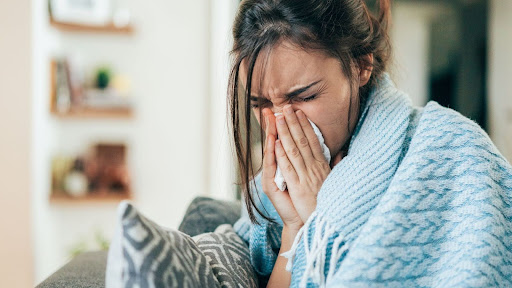Why Common Cold Occurs in Winter and How to Prevent It
8 min read
By DocGenie , Published on - 28 October 2024Winter, the season which is full of festive cheer, is usually accompanied by a not-so-welcome visitor: common cold. As the temperature drops and the air grows drier, our body defences weaken against viral attacks, which in turn, triggers spurring cases of cold.
In terms of behavioral patterns, there is a shift during the winter season. Winter tends to keep people indoors and closer together. This increases the chances of having the virus get into the body. In fact, schools, offices, and public transportation become a breeding ground for germs, providing an easy abode for the common cold virus to thrive.
The science behind this seasonal affliction is so interesting. With the fall in temperature, the relative humidity in the air drops as well. Dry air irritates the thin mucous membranes placed on the inner wall of our nasal passages, which are easily susceptible to viral attacks. In addition, low temperatures can make us weakened in general as far as the immune system is concerned, and the body's natural defences tend to weaken against those viruses.

Why Common Cold Occurs in Winter
To deal with the common cold, it is important to know why people fall prey to this winter pest:
| Factor | Description |
|---|---|
| Decreased Humidity | Cold air is typically dry, which irritates nasal membranes and reduces mucus production, impairing the body's defenses against viruses. |
| Indoor Crowding | People tend to spend more time indoors in close proximity, increasing the likelihood of virus transmission. |
| Weakened Immune System | Low temperatures can weaken the immune response, making individuals more susceptible to infections. |
- Decreased Humidity: Cold air is dry in nature, causing irritation to the thin mucous membranes of the nasal tract, which is sensitive to viral invasion. Low humidity level lowers the production of mucus, an element that traps viruses and bacteria within it, thus damaging our line of defence against these viruses.
- Indoor Crowding: As the weather turns cold, we spend a lot of time indoors. We often spend a lot of our time closely to others, especially in confined and crowded settings such as offices, schools, and public transportation settings. This setting predisposes us to cold viruses because our exposure to these viruses increases.
- Weakened Immune System: Cold weather can drastically affect our immune system. This is because we are exposed to the low temperatures, which lowers our level of immunity and increases our chances of getting infections. In addition, the stress of adapting to seasonal changes can further compromise our ability to ward off infections.
What is the Difference Between Flu and Common Cold?
While the common cold and flu are two distinct illnesses affecting the respiratory system, they differ in their symptoms and how severe they are. The symptoms of common cold are more of a mild nature compared to flu cases. Symptoms of the common cold include runny nose, congestion, and sore throat among others. Flu, on the other hand, presents symptoms that are generally of a more intense nature, encompassing fever, chills, body aches, and extreme weakness, which may lead to pneumonia in susceptible groups like the elderly and young children.
How to Prevent Cold in Winter

| Prevention Method | Description |
|---|---|
| Hygiene Habits | Regular handwashing with soap and water helps prevent germ transmission. Use hand sanitizer when soap is unavailable. |
| Boosting Immunity | Stay hydrated, eat a balanced diet rich in fruits and vegetables, prioritize sleep, manage stress, and stay active. |
| Strategic Vaccination | While flu vaccines do not prevent colds directly, they can reduce complications that might arise from overlapping infections. |
Hygiene Habits: Your First Line of Defense
- Frequent Handwashing: The best prevention of germ transmission is to keep your hands clean by washing them with soap and water often. This is especially important after visiting public areas or before eating. When soap and running water are unavailable, an alcohol-based hand sanitizer can be used.
- Mind Your Hands: Germs can enter your body through the eyes, nose, and mouth. Try not to touch your face, especially when your hands are unwashed.
Boosting Your Immunity: A Holistic Approach
- Hydration, Hydration, Hydration: Drink plenty of water; staying hydrated keeps the mucous membranes moist and creates a defensive barrier against viruses.
- Nourish Your Body: A diet rich in fruits, vegetables, and whole grains can provide the vitamins and minerals required for your immune system to function well.
- Prioritise Sleep: Better sleep creates a strong foundation to fend off germs in your body. Aim for 7 to 8 hours of sleep each night.
- Manage Stress: Chronic stress can lead to a weak response from your immune system. Do some form of relaxation technique such as meditation, yoga, or deep breathing to keep stress levels low.
- Stay Active: Regular exercises not only can boost your immunity but also improve blood circulation and promote well-being in general.
Strategic Vaccination
Of course, the flu vaccine may not have an effect on the common cold per se, but it indirectly protects you because it minimises the secondary infections created by having the flu. This includes the common cold, because it can occur when your immune system is weakened from having influenza.
Integrate these preventive measures into your life and minimise the chances of catching the common cold to enjoy a much better winter season.
How Do You Treat The Common Cold?
Some of the over-the-counter medications include acetaminophen and ibuprofen, both which reduce fever and body aches. There are also decongestants for congestion and cough suppressants if you develop a cough. Fluid intake is paramount. Resting, getting adequate sleep, and keeping up good nutrition also support recovery. Medical consultation with a health professional is suggested if symptoms last or worsen.
You can schedule a video consultation with a doctor on DocGenie. DocGenie allows you to seamlessly book appointments with top doctors across multiple specialties, anytime and anywhere.
| Treatment Type | Examples |
|---|---|
| Over-the-Counter Medications | Acetaminophen and ibuprofen for fever and body aches; decongestants for nasal congestion; cough suppressants for cough relief. |
| Home Remedies | Staying hydrated, resting adequately, and maintaining good nutrition can support recovery. |
Telemedicine: Your Winter Wellness Ally

- Receive Prompt Diagnosis: Diagnosis and treatment of a common cold are important to ensure proper management of the cold. Telemedicine offers the opportunity of timely consultations with healthcare professionals and allows for the proper diagnosis and beginning of the correct treatment.
- Get Personalised Treatment Plans: The common cold can affect individuals in different ways. Telemedicine enables the healthcare providers to administer a customised treatment plan so that your recovery will be optimised by taking into account your medical history and symptoms.
- Access Expert Advice: Telemedicine will connect you with professional health care practitioners who can offer advice and reassurance as well as guiding you on how to manage symptoms and prevent further complications.
- Reduce Exposure to Germs: In the meantime, telemedicine will also keep you away from unnecessary exposure to germs as you avoid visiting clinics and hospitals just for consultation purposes; more so during winter when most respiratory illnesses are common.
By combining these preventive measures with the convenience of telemedicine, you can significantly reduce your chances of catching the common cold and enjoy a healthier winter season.
With DocGenie, getting to connect with a doctor, talk to a doctor, and getting treatment for the common cold are all made simple and easy. Our doctors at DocGenie are dedicated to providing kind and effective care. With a video call, you can connect with a doctor from the comfort of your own home. DocGenie lets you get quality healthcare from anywhere, in a cost-effective way.
Conclusion
In conclusion, in the winter, there is a particular set of circumstances that might explain why the common cold is so common. The cold, dry air irritates the nasal passages, and thereby weakens the body's natural defences against invading viruses. Furthermore, the low humidity that exists during the winter months will not only dry out the mucous membranes but will also make them less likely to trap or remove viruses.Furthermore, increased time spent indoors during the winter means that the individual is exposed to more people, some of whom may already be infected. Thus, the virus could easily multiply in a non-ventilated room because it might remain suspended in the air for a long time and be inhaled by others. Therefore, a badly compromised immunity system added to high exposure brings about the common cold.
Thus, if we identify the factors causing infection, we can be proactive in protecting ourselves from the common cold. Measures like frequent washing of hands, avoiding contact with the infected in close proximity, and a healthy lifestyle can cut the risks of infection greatly. Hydration, good sleep, and reduced stress are paramount to strengthening one's immune system in the fight against the common cold.



